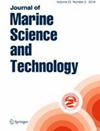甲醇作为船舶生态环境替代燃料:一个案例研究
IF 2
4区 工程技术
Q2 ENGINEERING, CIVIL
引用次数: 0
摘要
全球温室气体和空气污染物的排放受到航运的显著影响。用于能源生产的柴油燃料是这些排放的主要原因。本研究推荐用甲醇替代传统船用柴油作为船用燃料。此外,还对甲醇-柴油双燃料发动机的环境效益和经济效益进行了数值分析。一艘名为科斯塔托斯卡纳的游轮被作为一个案例进行了评估。数据显示,双燃料发动机的CO2、NOx、SOx和PM排放量分别降低了25.7%、38.46%、45%和45%,成本效益分别为286.5、6645、268403.4和358759.8美元/吨。根据调查结果,将发动机转换为使用两种燃料将符合所有现行和即将出台的国际海事组织关于空气污染物排放的标准。此外,游轮推荐的双燃料发动机将节省1757万美元/年的燃料成本。本文章由计算机程序翻译,如有差异,请以英文原文为准。
Methanol as an Eco-Environmental Alternative Fuel for Ships: A Case Study
Global emissions of Green House Gases and air pollutants are significantly influenced by shipping. Diesel fuel use for energy production is primarily responsible for these emissions. The substitution of traditional marine diesel oil with methanol as a marine fuel is recommended in this study. Moreover, the methanol-diesel dual-fuel engine's environmental and financial benefits are investigated numerically. A cruise passenger ship named Costa Toscana has been evaluated as a case study. Based on the data, the suggested dual-fuel engine reduces emissions of CO2, NOx, SOx, and PM by 25.7%, 38.46%, 45%, and 45%, respectively, with a cost-effectiveness of 286.5, 6645, 268403.4, and 358759.8 US$/ton, respectively. According to the findings, converting an engine to run on two fuels will comply with all current and upcoming IMO standards regulating emissions of air pollutants. In addition, the cruise ship's recommended dual-fuel engine will save 17.57 million USD/year in fuel costs.
求助全文
通过发布文献求助,成功后即可免费获取论文全文。
去求助
来源期刊

Journal of Marine Science and Technology
工程技术-工程:海洋
CiteScore
5.60
自引率
3.80%
发文量
47
审稿时长
7.5 months
期刊介绍:
The Journal of Marine Science and Technology (JMST), presently indexed in EI and SCI Expanded, publishes original, high-quality, peer-reviewed research papers on marine studies including engineering, pure and applied science, and technology. The full text of the published papers is also made accessible at the JMST website to allow a rapid circulation.
 求助内容:
求助内容: 应助结果提醒方式:
应助结果提醒方式:


